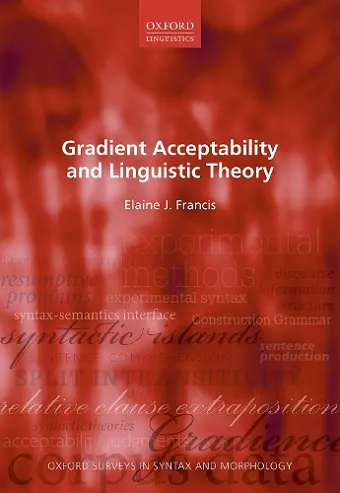Gradient Acceptability and Linguistic Theory
Format:Hardback
Publisher:Oxford University Press
Published:15th Dec '21
Currently unavailable, and unfortunately no date known when it will be back
This hardback is available in another edition too:
- Paperback£36.99(9780192898951)

This book examines a challenging problem at the intersection of theoretical linguistics and the psychology of language: the interpretation of gradient judgments of sentence acceptability in relation to theories of grammatical knowledge. Acceptability judgments constitute the primary source of data on which such theories have been built, despite being susceptible to various extra-grammatical factors. Through a review of experimental and corpus-based research on a variety of syntactic phenomena and an in-depth examination of two case studies, Elaine J. Francis argues for two main positions. The first is that converging evidence from online comprehension tasks, elicited production tasks, and corpora of naturally-occurring discourse can help to determine the sources of variation in acceptability judgments and to narrow down the range of plausible theoretical interpretations. The second is that the interpretation of judgment data depends crucially on the theoretical commitments and assumptions made, especially with respect to the nature of the syntax-semantics interface and the choice of either a categorical or a gradient notion of grammaticality. The theoretical frameworks considered in this book include derivational theories (e.g. Minimalism, Principles and Parameters), constraint-based theories (e.g. Sign-based Construction Grammar, Simpler Syntax), competition-based theories (e.g. Stochastic Optimality Theory, Decathlon Model), and usage-based approaches. The volume shows that while acceptability judgment data are typically compatible with the assumptions of various theoretical frameworks, some gradient phenomena are best captured within frameworks that permit soft constraints-non-categorical grammatical constraints that encode the conventional preferences of language users.
The greatest strength of Francis' book lies in the author's meticulous and nuanced interpretations of a broad range of experimental results. These discussions not only illustrate the value of good scientific practice, but they also highlight how difficult it is to derive conclusive interpretations about the factors that give rise to acceptability judgments. * Tobias Ungerer, Journal of English Language and Linguistics *
The book bridges the interests of theoretical linguistics in the field of syntax, experimental syntax, and related aspects in the psychology of language [...] All in all, this book is a must for future work on acceptability judgments for the complete overview it offers, the well-reasoned argumentation, and the author's own claims on gradience and soft constraints to capture the wide range of linguistic factors that can affect judgments on a gradient scale. * Caterina Cacioli, Università degli Studi di Firenze, LINGUISTList *
The question that runs through the entire book can be summarized as follows: how can we interpret the judgments that speakers make about the acceptability of sentences of their language in relation to the theories held by the linguists who analyze them? That question involves one aspect that is often not made explicit: the interpretation of any data is conditioned by commitments and theoretical assumptions, both epistemological and methodological. The explanation of and reflection on this key point for any scientific field is one of the central axes of this book, making it essential reading. * Gabriela Mariel Zunino, Cuadernos de Lingüística de El Colegio de México *
This book is a truly far-reaching, relevant piece of work. In addition to a comprehensive discussion on gradient acceptability judgments, it also presents an overview of current theoretical approaches and possible limitations they might exhibit in interpreting gradient judgments. One of the truly remarkable achievements of this book is the way in which Francis critically discusses the differences between the current theoretical approaches, but at the same time, brings together ideas from different linguistic schools of thought - which is certainly not an easy task to undertake. * Ana Werkmann Horvat, Jezikoslovjle *
Francis tackles head-on deep methodological questions about the nature of linguistic data, and shows that modern linguistic research demands a more systematic exploration of variation and gradient acceptability; one that takes non-syntactic factors into account, uses converging evidence from alternative data sources, and re-assesses its own theory-internal assumptions. In the process, Francis uncovers compelling evidence that some forms of gradience call for non-categorical grammatical constraints ('soft constraints'), which cannot be reduced to non-syntactic factors nor categorical grammar constraints. * Rui P. Chaves, University at Buffalo, the State University of New York *
Elaine Francis' book is compelling reading as it addresses a complex topic with fundamental relevance to all grammatical descriptions and theories. Francis makes a convincing case for gradience in grammar and for a multi-methodological approach to assessing language data. It is a comprehensive and principled synthesis of the literature enriched by the author's own research. * Edith Moravcsik, University of Wisconsin-Milwaukee *
ISBN: 9780192898944
Dimensions: 251mm x 174mm x 25mm
Weight: 676g
288 pages